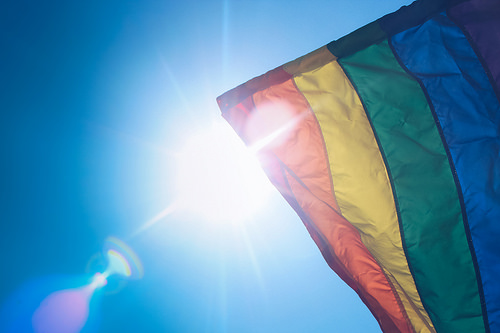I’m speaking to a group of lawyers this week about being non-binary. Since I’m always me, I asked my Facebook friends to tell me what question they have or have had about my non-binary experience or non-binary people in general to help me prepare.
One friend sent me a direct message and respectfully asked, “Why is a non-binary identity important to you? Why does it matter?” She went on to say that my name, gender, or pronouns wouldn’t change our relationship. (My friends know that I welcome all sincere questions. If they’re trying to be respectful and inadvertently say something wrong, I will not be offended.) It’s a valid question, and one that does not surprise me coming from a person I know to a cisgender heterosexual.

Non-Binary People Exist
Being non-binary matters as much as it matters to be any other gender. Unlike men and women, I live in a society that often doesn’t acknowledge that I exist. Whenever I need to use a public bathroom or fill out a form and there are only male/female options, the message I hear is that people like me don’t deserve the same acknowledgment as men and women, that they don’t believe I exist, or that I don’t matter.
When there are only male and female facilities available, if I’m not welcome to use either option, then I’m not comfortable using any of them. Earlier this year, I attended a conference where there were only men’s and women’s bathrooms. I didn’t want the organizers to have to deal with an uncomfortable situation of someone complaining that I was in the men’s room, so we agreed that I’d use the bathroom in my hotel room. (The conference was in the same hotel where I was staying.) This worked fine until the last day, when I’d checked out of my room. I felt like an imposter using the women’s room when I needed it.
I live in a society that doesn’t even have terminology for non-binary people. There is no gender-neutral term for “sir” or “ma’am,” though I’m in favor of adoption “pe’n,” short for “person.” Most people don’t know that the non-binary alternative to Mr./Ms. is Mx. (pronounced “mix”). When my sister got pregnant, I had to pick my own title since there is no gender-neutral term for “aunt” or “uncle.” (This is a common question in the Non-Binary Gender Pride Facebook group, also what do you call a non-binary parent, significant other, spouse, or child.) My sweet nibling has aunts, uncles, guncles (gay uncles – they picked their title too), and an oggy (me). (“Oggy” rhymes with “doggy.”)
I’m Legally Non-Binary – and Still Not Recognized
I have a non-binary birth certificate. (Thank you, California!) I am legally recognized as being neither male nor female, and yet, I can’t get a driver’s license in Arizona that reflects this. The State Department will not issue me a non-binary passport. The State Department won’t even issue one to Dana Zzyym, an intersex person, even though it’s been court-ordered to do so. When I travel, I bring my passport and my birth certificate in case I have to explain why some of my tickets says non-binary and some say male or female – because not all airlines have the non-binary gender option, but I should be able to use it since I’m legally non-binary.
In most places, I can’t even walk down the street on a hot day with my shirt off like my male counterparts without the risk of getting a ticket for indecent exposure, even in California. (Arizona law says “female areolas” must be covered. I don’t think a judge would throw the case out if I went in with my birth certificate that proves I’m not female, and thus, I can’t be in violation of this law.) Thankfully, MeUndies hooked me up with a nude bralette so I can at least give the illusion of toplessness at a distance. I could also wear my nude chest binder, but I tend to overheat in that thing.
Men and women in the U.S. have never had to fight just to say they exist. Women have to fight for equality, but they’ve never had to fight to be recognized as different from men. In regard to legal rights, my friend’s question made me think:
- Why was it important for blacks to be counted a whole person and not 3/5 of a person?
- Why was important for women to get the vote?
- Why was it important to prohibit discrimination based on a person’s race?
- Why was it important to legalize same-sex marriage?
Non-binary people are different than men and women. We often live in societies that only recognize males and females – socially and culturally. When I realized that I was non-binary, something clicked into place. Up until then, I thought I was just a weird girl. I didn’t understand why the other girls and women seemed so different than me. When I realized that I’m non-binary, it made sense why I felt like I was so different than the other girls I grew up with – because I am! And even though we’re different, and live in a binary-centric society, we still deserve the same rights and freedoms as everyone else, and to be acknowledged for who we are.
I guess that’s why being non-binary matters to me. I want to be seen as who and what I am.
